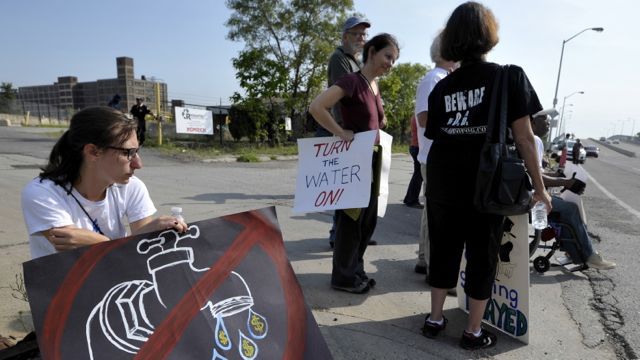
This post originally appeared at The Nation.
As Michigan Governor Rick Snyder and his appointed “emergency manager” were steering Detroit into bankruptcy last fall, the public-policy think tank Demos released a groundbreaking report on the city’s financial circumstance — and how to address it.
Demos recognized that deindustrialization, high unemployment and an exodus of residents had left Detroit uniquely vulnerable: “the current bankruptcy filing is the result of a severe decline in revenue, caused by the 2008 financial crisis, and cuts in annual state revenue sharing starting in 2011. Risky Wall Street deals further jeopardized the city’s public finances by threatening immediate payments that the city could not afford.”
Now, as the Detroit Water and Sewage Department is drawing international criticism for shutting off water service for low-income families, activists are asking why the people are being forced to pay while the Wall Street banks live large. On Friday, members of the National Nurses United union and local, state and national groups marched and rallied in downtown Detroit to say the priorities are out of whack.
Their message is direct: “Let’s Tax Wall Street, Get Our Money Back, and Turn on the Water!”
As a writer who has covered the debate about Detroit for several years now, I welcome and embrace this recognition that what’s happening in this city has a lot to do with the warped priorities of our current age of austerity.
It really is time to put things in perspective.
While politicians and pundits have tried to blame pensions, public servants and public services for the city’s financial challenges, the Demos report noted that “Detroit’s financial expenses have increased significantly, and that is a direct result of the complex financial deals Wall Street banks urged on the city over the last several years, even though its precarious cash flow position meant these deals posed a great threat to the city.”
The author of the report, Wallace Turbeville, a former Goldman Sachs investment banker, founder of the Kensington Group and well-regarded expert on infrastructure finance and public-private partnerships, was blunt in his assessment of the sources of the city’s challenges and the proper response.
“Misguided and irresponsible decisions by politicians over the years, often at the urging of Wall Street, have funneled wealth out of Detroit’s neighborhoods, and enriched financial institutions and corporations in the process,” said Turbeville, a Demos fellow. “If Detroit wants to come back from this and rebuild a strong economy, it needs to reverse that trend and start prioritizing the people who live here over the interests of Wall Street bankers.”
Unfortunately, under an emergency-management scheme that puts political appointees rather than elected officials in charge, Detroit has not been very good at “prioritizing the people who live here.”
This reality has been highlighted by the Water and Sewage Department’s mass water shutoffs.
The Detroit Water Brigade, a local activist group that is striving to assure families do not suffer for lack of water, reports that the shut-off strategy “will effect over 120,000 account holders over a three-month period (June-September 2014) at a rate of 3,000 per week. This accounts for over 40 percent of customers who are using the Detroit Water system and has been dubbed a violation of human rights by various organizations. 70,000 of those accounts are residential accounts which could amount to anywhere from 200,000-300,000 people directly effected.”
Food and Water Watch, the national nonprofit health and safety watchdog group, says, “This is not sanitary and violates the human right to water and sanitation. In fact, with improper disposal of waste, these shut-offs pose serious health concerns.” The international Blue Planet Project complains that “in order to make the utility attractive to investors, lower-income households are being forced to pay exorbitant rates for their water and sewer services or see their access cut. Water rates have risen in Detroit by 119 percent in the last decade. With unemployment rates at a record high, and the poverty rate at about 40 percent, Detroit water bills are unaffordable to a significant portion of the population.”
Sorting out Detroit’s financial troubles will not be easy, and the process will not go quickly. But there should be an understanding that the people who live in Detroit need protection, not pressure from bill collectors and proponents of privatization. As Turbeville notes, “This program [of shutting off access to water] is morally indefensible and contrary to basic principles of shared responsibility. It punishes Detroit’s citizens for a complex set of circumstances that have interacted to produce an economic crisis much more intense than the effects of the Great Recession in other cities. It also reinforces the myth that the people of Detroit cannot govern themselves without discipline from the rest of the state.”
Detroit residents do not need punishment and discipline. They need resources.
Congressman John Conyers, D-Detroit, has pointed to ways in which the federal and state governments could ease the pressure in the short term. But in the long term, there will be a need for real revenues to aid the people not just of Detroit but for all Americans.
Those revenues can and should come from Wall Street speculators.
NNU and its allies are arguing that a “Robin Hood Tax” — a small fee on financial transactions — should be enacted as a vehicle to “tax hedge funds and (to assert that) the rest of the financial sector should pay their fair share to clear up the mess they helped create.”
Specifically, they are backing the “Inclusive Prosperity Act” (HR 1579), a measure proposed by Representative Keith Ellison, D-MN, to use a tax on Wall Street transactions and to gain revenue needed to meet human needs.
The list of backers for the march is long. In addition to NNU, it now includes the International Union United Automobile, Aerospace & Agricultural Implement Workers of America (UAW AFL-CIO), the Michigan Sierra Club, Food and Water Watch, Netroots Nation, the Metropolitan Detroit AFL-CIO, the Michigan Nurses Association, the Canadian Federation of Nurses Unions, We the People of Detroit, Moratorium Now!, the Michigan Welfare Rights Organization, the People’s Water Board, the Detroit Water Brigade and dozens of additional labor, religious and community groups.
People are coming to recognize that it is indeed time to start prioritizing the people who live in Detroit over the interests of Wall Street bankers.


